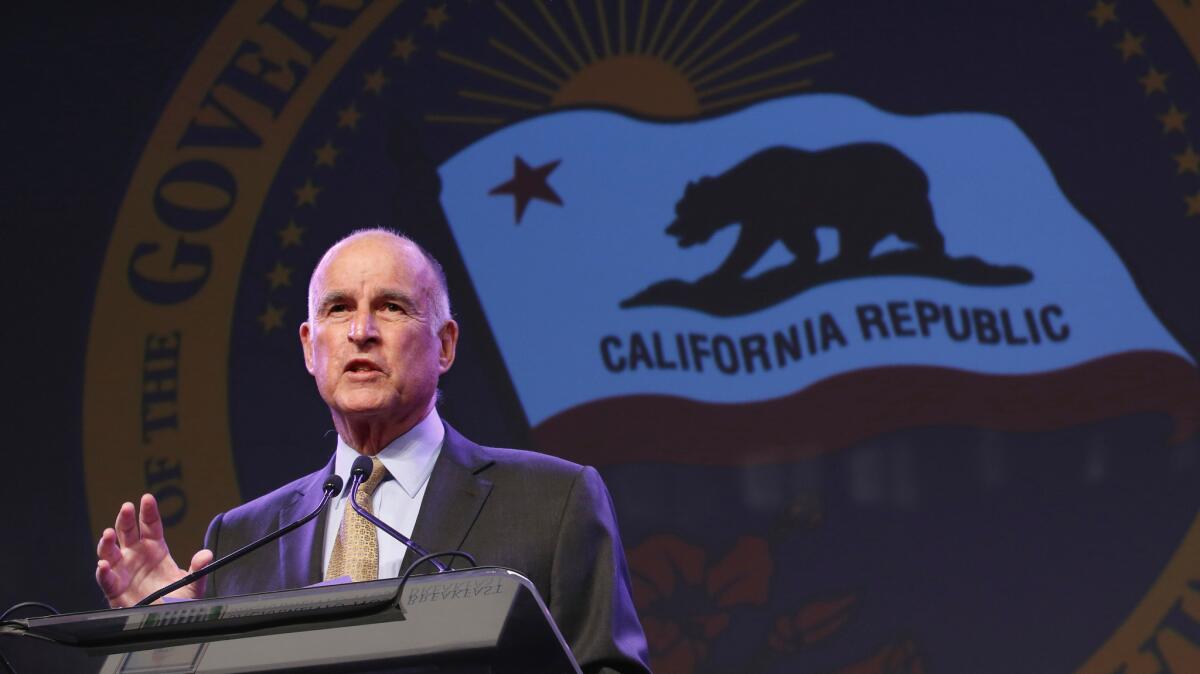Editorial: California lawmakers: Don’t punt on climate change

- Share via
Four weeks from the end of the legislative session it appears that lawmakers will punt, rather than vote, on one of the most important environmental decisions facing California. At stake is the state’s leadership role in fighting climate change.
SB 32 was envisioned as the next logical, albeit ambitious, step in California’s push to combat climate change. The bill was expected to build on AB 32, the landmark Global Warming Solutions Act of 2006, which required the state to bring down greenhouse gas emissions by 2020 to what they had been in 1990. California is on track to meet that goal, and SB 32 would have set the next target: reduce emissions to 40% below the 1990 level by 2030.
Gov. Jerry Brown announced the new goal in his 2015 inaugural speech, and Democratic Sen. Fran Pavley, who wrote the Global Warming Solution Act, drafted Brown’s vision into SB 32. But the bill stalled last year in the Assembly amid tremendous lobbying from the oil industry. Pavley carried the bill over to the current session. Again, it has been held up by the oil industry and business-friendly Democrats in the Assembly.
But the bill has also faced some obstacles put in its way by Brown, who has been trying, unsuccessfully apparently, to craft a grand compromise with Big Oil and other opponents that would both set the new 2030 targets into law and safeguard the state’s cap-and-trade program from legal challenges. Cap and trade is the centerpiece of the state’s plan to cut greenhouse gases; it sets a pollution cap and then allows companies to buy permits to pollute above their specific allowances. The money the state collects from the sale of permits is supposed to be used to help reduce emissions elsewhere. Thanks to a lawsuit, the cap and trade program is currently in legal limbo, which has resulted in dramatic drop in the price of the permits and significantly less money to spend on pollution-fighting projects.
After harried negotiations in the Capitol, state leaders indicated late last week that they were unlikely to reach a deal anytime soon. Assembly Speaker Anthony Rendon (D-Paramount) said it wasn’t “imperative” to pass a bill this year. Senate President Pro Tem Kevin de Leon (D-Los Angeles) said he wanted to pass the extension of greenhouse gas reduction targets, but he would “not negotiate a bad deal just to get a deal.” And in a move that demonstrates just how difficult it may be to reach an agreement, Brown’s office announced that the governor was prepared to bring the issue before voters at the ballot in 2018, if necessary.
Even with the apparent failure of SB 32, state leaders were quick to assert last week that California is still committed to its aggressive greenhouse gas reduction programs. No one pretends that California can reverse global warming on its own, but by demonstrating success in a state as large as this one, California has tried to persuade other governments to adopt their own aggressive climate change policies.
Brown’s top aide bragged that no other state or nation in the Western Hemisphere has done more to curb carbon pollution than California, and she suggested that the fate of SB 32 won’t “make or break” the state’s climate agenda. That may be true. But the delay doesn’t help. Having 2030 targets in place solidifies California’s commitment to cutting greenhouse gases, which gives businesses certainty on what to expect and sends a market signal that the state will continue to invest in clean technology. The longer lawmakers dither, the more the value of cap-and-trade permits are likely to decrease, meaning less money for clean-air programs.
And this is the second year in a row that oil companies and business-friendly Democrats have blocked bills aimed at ratcheting down greenhouse gas emissions. Their opposition continues despite the fact that California’s economy has grown while the state has begun reducing its greenhouse gases.There’s no reason to think it will be any easier to pass the new targets next year. Plus, recent polling shows that voters strongly support the goal of cutting emissions to 40% below the 1990 levels by the year 2030. According to a Public Policy Institute of California survey, residents support the state’s aggressive climate change laws even if they mean paying more for gas and electricity.
That makes lawmakers’ reluctance to support SB 32 all the more puzzling. The world is watching — will California continue to lead or not?
Follow the Opinion section on Twitter @latimesopinion and Facebook










